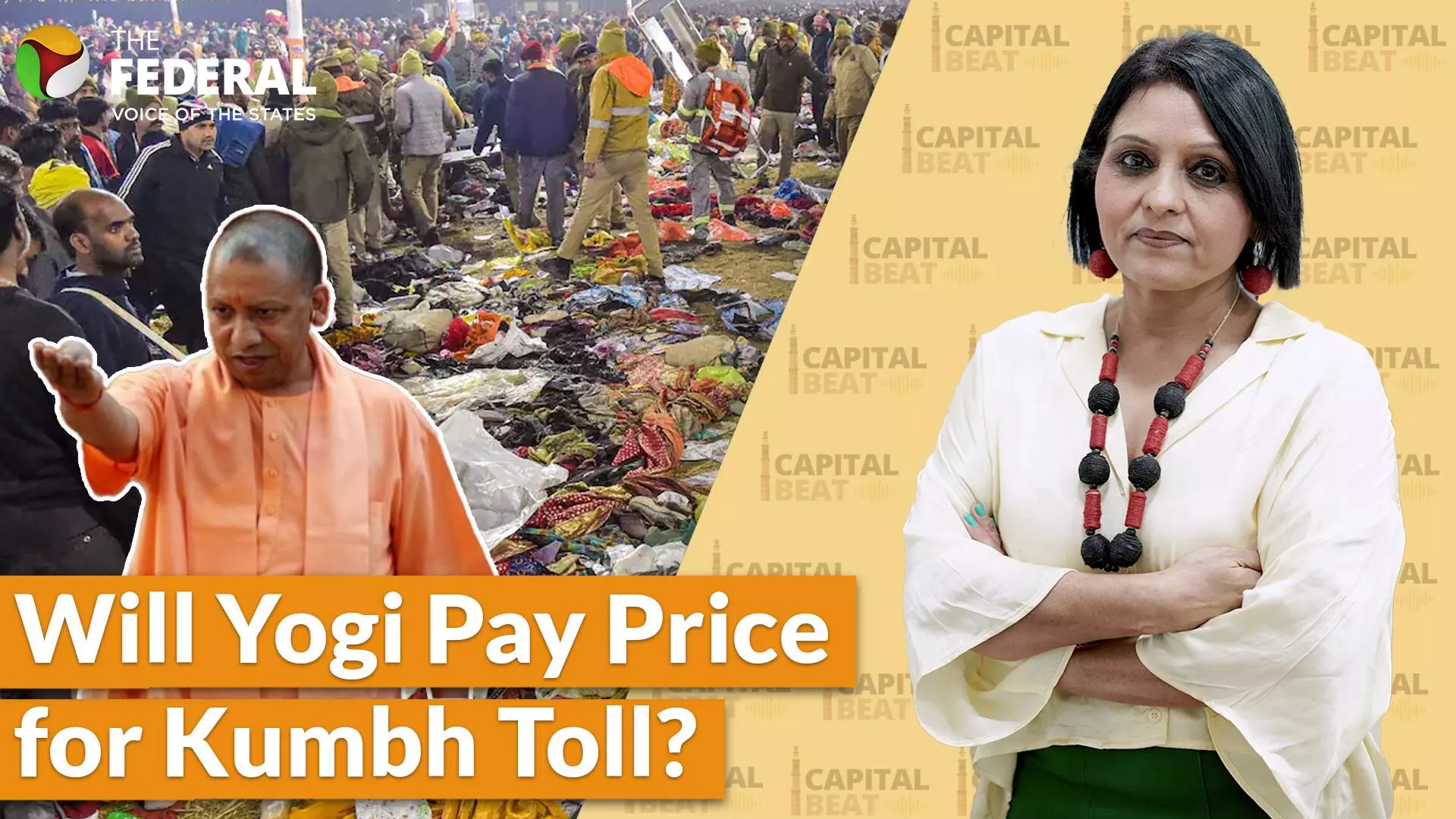
Capital Beat | 'Not 37, 82 died in Kumbh stampede': Will BBC report impact Yogi?
Panellists analyse if BBC finding, that raises questions on transparency and accountability, will have any impact on Yogi government or in serving justice to victims

In this episode of Capital Beat, panellists Sharad Pradhan and Sunita Aron dissect BBC Hindi's investigation that contradicts the Uttar Pradesh government's official account of the Kumbh Mela stampede in Allahabad this year.
The report claims that 82 people died, more than double the government’s figure of 37, and raises troubling questions about transparency, accountability, and political priorities.
With Prime Minister Narendra Modi and Uttar Pradesh Chief Minister Yogi Adityanath choosing silence over the issue, the debate now shifts to whether justice will be served or whether the truth will continue to be buried.
Shocking findings
The discussion kicks off with journalist Sharad Pradhan commending the BBC’s “well-crafted” and “rare” investigative report. According to the BBC, its journalists conducted an exhaustive investigation across 11 states and over 50 districts, compiling interviews and documentary evidence such as hospital records and death certificates.
The findings reveal that compensation was often tied to the concealment of the cause of death. “Twenty-six families were paid Rs 5 lakh on the condition they signed documents saying their loved ones died of illness,” the report claimed.
Only 37 deaths were officially acknowledged by the state, with Rs 25 lakh compensation promised to the kin of the deceased, but the BBC identified a total of 82 fatalities.
Pradhan didn't mince words: “The Uttar Pradesh government under Yogi Adityanath has gotten away with murder before. Remember the COVID bodies floating in rivers? They got a WHO certificate for ‘best COVID management’ while people were dying for lack of oxygen.”
'Muted media, political silence'
Sunita Aron criticised both the mainstream media and the state machinery for their silence. Drawing a sharp comparison, she noted, “When the Bengaluru stampede happened, channels demanded resignations from Siddaramaiah and DK Shivakumar. But in Uttar Pradesh, there’s a deafening silence.”
She added that while the media's indifference is disturbing, what is more shocking is the lack of any official reaction. “Neither the Centre nor the state governments have acknowledged the report. The least they could have done is order a probe,” she said.
The discussion also questioned why Rs 5 lakh in cash was paid without proper documentation. “Where did this money come from? Most likely from secret government funds that are not audited,” said Pradhan.
'Concealment Yogi's forte'
Both panellists agreed that Chief Minister Yogi Adityanath’s concern was more political than humanitarian. Pradhan revealed that a senior official told him the government had knowledge of 67 deaths on the day of the stampede, but the chief minister insisted on capping the number at 37, just under the 2013 Kumbh death toll during Akhilesh Yadav’s tenure.
“That shows his mindset, more worried about optics than lives lost,” Pradhan said.
When asked if Yogi would initiate a probe to save face, both panellists were skeptical. “Concealment is his forte,” said Pradhan bluntly. Sunita Aron agreed and added, “He oversaw all the arrangements. How can he now claim ignorance?”
Call for wider inquiry
Aron stressed the need for a broader investigation: “Even if the chief minister doesn’t act, the judiciary or the opposition can step in. A PIL can be filed demanding an inquiry.”
Pradhan, however, pointed out a systemic problem. “Delhi won’t act either, as they themselves have targeted the BBC in the past. Endorsing this report would be politically embarrassing for the Centre.”
Both panellists raised the possibility that international human rights agencies could step in, but acknowledged that such intervention is unlikely in today’s global political climate.
Political fallout
When asked whether this report could influence the 2027 Uttar Pradesh elections, the answers were grim. Pradhan noted that opposition parties are too afraid of being branded “anti-Hindu” if they question a Hindu religious gathering. “They lack conviction. Otherwise, this is the kind of issue that can bring down a government,” he said.
Aron agreed that this was a golden opportunity for the Opposition. “They could have embarrassed the government, hit the streets, and moved the High Court. But just tweeting isn’t enough.”
Will justice prevail?
The discussion concluded with a sense of dismay at the lack of accountability. “Even the younger brother of RSS veteran Govindacharya was declared ‘unclaimed’. That’s how callous the system is,” said Pradhan.
Host Neelu Vyas summed up the debate: “The evidence is out there. The report is credible. And yet, the mainstream media remains silent. How long can this truth be ignored?”
The content above has been generated using a fine-tuned AI model. To ensure accuracy, quality, and editorial integrity, we employ a Human-In-The-Loop (HITL) process. While AI assists in creating the initial draft, our experienced editorial team carefully reviews, edits, and refines the content before publication. At The Federal, we combine the efficiency of AI with the expertise of human editors to deliver reliable and insightful journalism.

